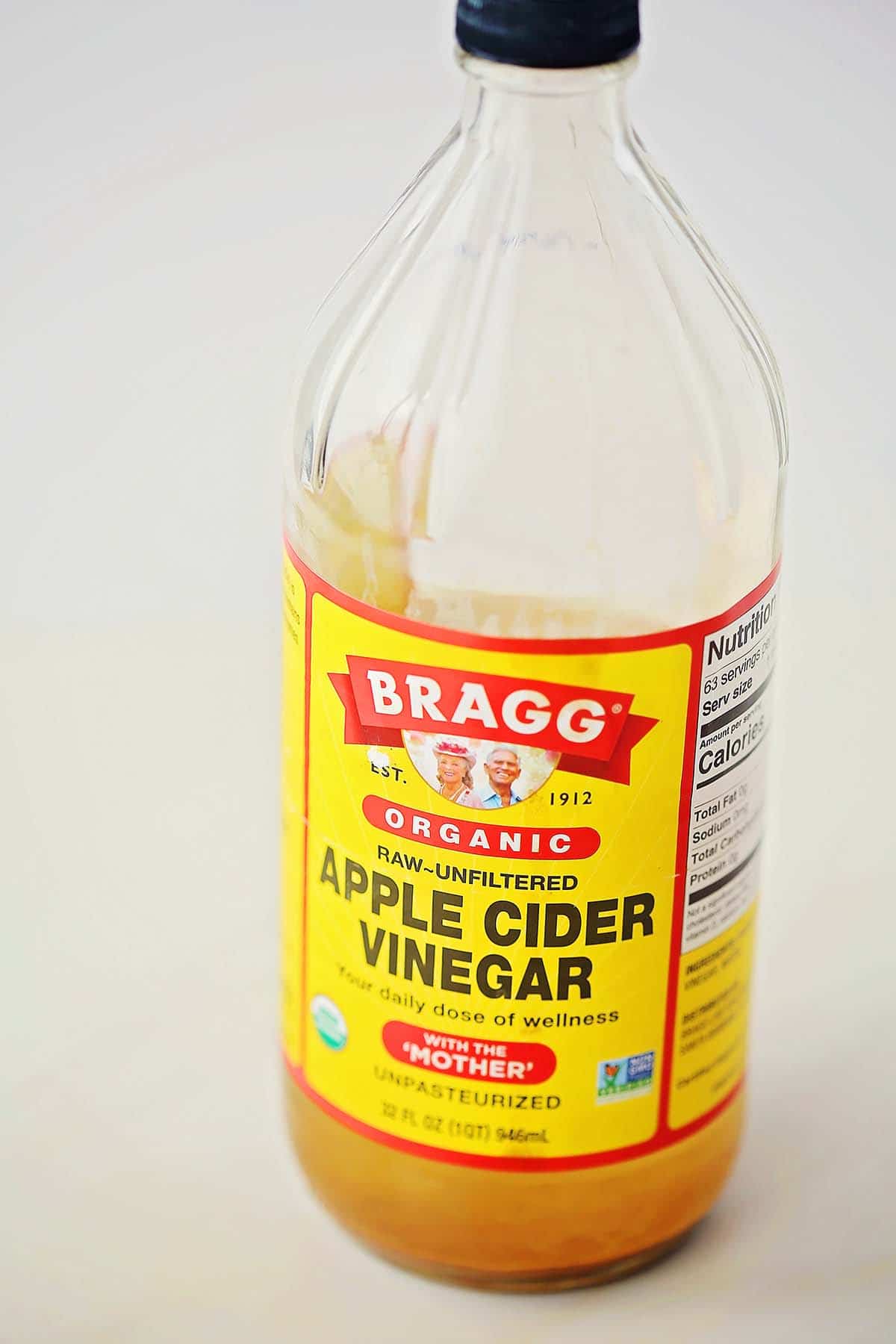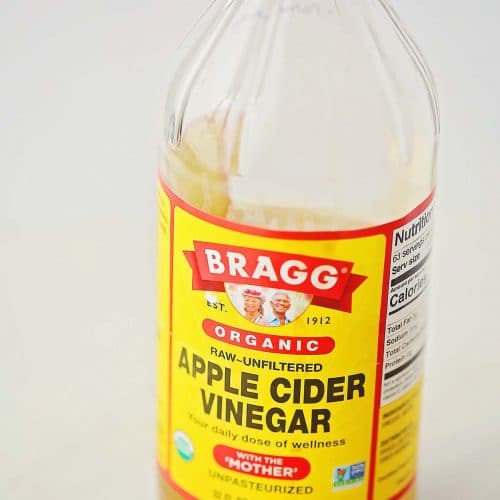Check out the options below and pick the best substitute for apple cider vinegar that works for you.
How many recipes can you think of that include this ingredient? You may be surprised that apple cider vinegar is more common in recipes than you think. This is especially true when it comes to baking or even marinades for meat.
So, what happens when you don’t have it in your pantry? You can go out and find apple cider vinegar in most stores or use the alternatives below.
Jump to Recipe
Apple cider vinegar, or ACV, is basically fermented apple juice.
This light golden vinegar is made from apples.
The process of creating apple cider vinegar takes time:
First, people pulverize and ferment them.
Then, they combine these smashed apples with yeast to create alcohol.
From there, they add bacteria to produce acetic acid. This typical acetic acid content gives apple cider vinegar a sour taste and smell.
While some people drink diluted apple cider vinegar as a health tonic, it also has many uses in the kitchen.
You can use ACV in baking recipes, including vegan cakes. It is also handy in sweet recipes, marinades, sushi rice, and salad dressings.
Here are the best 11 alternatives to use instead of apple cider vinegar.
Red wine and white wine vinegar are also made from fruits.
You’ll have a similar sweetness when using them.
White wine and red wine vinegar have the same acidic taste and sourness that ACV provides.
Pros
Red and white wine vinegar are commonly found in the store. Both are relatively easy to find.
Cons
The taste of red wine vinegar or white wine vinegar is stronger than apple cider vinegar. This might change your dish’s flavor.
Red wine vinegar will also change the color of lighter dishes to a slight pink hue.
Cooking Tip:
Use red wine vinegar and white wine vinegar instead of ACV in a 1:1 ratio.
Surprisingly, apple juice is a good substitute for apple cider vinegar.
You’ll get the same apple flavor because apples are the main ingredient.
Since it is not vinegar, it will not add the same acidic taste to dishes.
Note that store-bought apple juice usually has a good amount of sugar.
Pros
Apple juice works well to add a sweet apple flavor to baked dishes and vinaigrettes. It’s easy to come by in the store. You may even find it in your pantry if you pack lunches often for your children.
Cons
There is no acidic taste, so it can make certain dishes too sweet.
Cooking Tip:
Use apple juice in a 2:1 ratio – even for your homemade apple juice version.
Lemon juice is a great way to add acidity and bold flavor to dishes.
Fresh lemons have a fruity taste that mimics apple cider vinegar.
The juice works well in cooked and baked recipes. Vinaigrettes will also taste great with this citrus juice.
It creates a similar acidic taste that usually arises from apple cider vinegar.
This is a better substitute for apple cider vinegar than apple juice if sugar intake is to be considered.
Pros
The juice works well in cooked and baked recipes. Vinaigrettes will also taste great with this citrus juice.
It creates a similar acidic taste that usually arises from apple cider vinegar. You can also use pre-squeezed lemon juice in marinades for nearly all types of meat.
Cons
This option is sourer than ACV. It also has a strong tangy flavor, which may not mesh well with all recipes.
Cooking Tip:
Use lemon juice in a 1:1 ratio. If the sour taste is too strong for you, start with ¾ tablespoon of lemon juice and adjust as needed.
Orange juice is also a fruit juice; it has many similar properties to lemon juice.
It has the acidity, fruity flavor, and brightness needed.
This citrus fruit juice tastes sweeter than lemon juice and apple cider vinegar.
It works well for marinades for different meats – a great example is ribs.
Pros
When it comes to macro nutrition, orange juice is rich in vitamin C, folate, and potassium.
Cons
The distinct flavor of oranges might not go well with all recipes.
Cooking Tip:
Use the same amount of orange juice as the amount of apple cider vinegar called for.
Distilled white vinegar can be used as an apple cider vinegar substitution.
It adds a similar acidic taste to apple cider vinegar.
But it has a higher acidity and a bland taste, so it’s best used as a last resort.
You can utilize it in cooked dishes like stir fries and raw food items like salad dressings.
Pros
Distilled white vinegar has a neutral taste. You can add it to any dish that uses apple cider vinegar without issues.
Cons
The flavor will be lacking because it does not have the fruitiness or sweetness of ACV.
Cooking Tip:
Use white vinegar in a 1:1 ratio for apple cider vinegar. Consider adding a squeeze of fresh juice (lime, lemon, orange) to give it a similar taste.
Malt vinegar also works as an apple cider vinegar substitute.
It does not have a fruity flavor as fermented barley is used instead of apples or grapes.
You can use it in savory dishes like pulled pork, marinades, and stews.
Pros
Malt vinegar will provide a similar acidic vinegar taste to dishes.
Cons
This vinegar is not the most accessible ingredient to find. You’re more likely to find this vinegar swap online than in your local grocery store.
It also adds a taste of yeast so that it will alter the flavor of the dish.
Cooking Tip:
Use in a 1:1 ratio when swapping malt vinegar with apple cider vinegar.
Sherry vinegar is created from sherry wine and has complex wine-like flavors.
It can still be considered one of the best apple cider vinegar substitutes.
You’ll find acidity and a sweet taste in this substitution.
You can also expect caramel notes and a nutty taste. This difference in flavor makes it a substitute for specific recipes, not all.
Otherwise, the consistency of this vinegar nearly mimics that of ACV. Use this vinegar replacement in marinades, sauces, and even salad dressings.
Pros
Sweetness and acidic flavors are added to any dish with sherry vinegar. For this reason, it’s an easy substitution for those who like the taste.
Sherry vinegar also offers a slightly fruity taste. After all, sherry comes from grape juice.
Cons
Not everyone enjoys the taste of sherry vinegar, making it tricky to use. The complex flavors that sherry vinegar brings to the table do not work well in all recipes. For this reason, this may not be the best substitute for dishes with a distinct flavor.
Cooking Tip:
Use sherry vinegar in a 1:1 ratio.
Lime juice works remarkably well as a suitable alternative if you don’t have lemon juice.
This substitute provides both the acidity and the fruity taste.
Lime juice will be slightly more sour and not as sweet as apple cider vinegar. This may prompt you to add a sprinkle of sugar to the dish.
Pros
You can use this fresh citrus juice in both cooked and uncooked recipes. This juice gives dishes an acidic, similar fruity undertone and tart taste as ACV.
Lime juice is easy to find, whether you are juicing your fresh limes or purchasing a canister from the store.
Cons
As this juice leans on the sour side, it might not work well in all recipes. If you’re squeezing limes for a recipe, it will add extra time.
Cooking Tip:
Use this alcohol-free alternative in a 1:1 ratio, like lemon juice. A combination of lemon and lime juice will also work.
Champagne vinegar is yet another one of the best apple cider vinegar substitutes.
Like ACV, champagne vinegar comes from fruits, providing a similar fruity flavor.
Champagne vinegar is created by combining Chardonnay and Pinot Noir grapes. The mixture is then subjected to the fermentation process.
When it comes to taste, champagne vinegar is a bit milder than ACV.
Pros
Champagne vinegar does not have a complex taste. It can be used freely instead of ACV without altering the dish’s flavor.
Cons
You might need to use more of it because it is not as intense.
Cooking Tip:
Start with a 1:1 ratio. ou might need to use more of it because it is not as intense.
Rice wine vinegar is also an excellent substitute for apple cider vinegar. Some prefer to call it just rice vinegar.
As with other kinds of vinegar, you can expect acidity.
Rice wine vinegar does not come from fruit but still presents a fruity sour taste.
This vinegar is created when rice is fermented twice.
It works well as a topping for salads, soups, and rice recipes.
This vinegar is also great in savory recipes.
You will find rice vinegar less acidic, so you may want to add a few drops of lemon or lime juice.
Pros
Rice vinegar is quite versatile in the dishes you can add it to. It is also easily found in the Asian section of the grocery store.
Cons
This sub is not a perfect match and can alter the taste of dishes.
Cooking Tip:
Use an equal part of rice vinegar as the amount of apple cider vinegar called for in the recipe.
Balsamic vinegar is slightly sweeter than ACV. Despite this, it can still substitute for apple cider vinegar.
This is because balsamic vinegar is made from grapes and has the same fruity flavor.
The consistency is also the same so that you won’t see any change in the texture of your dish.
Pros
It is very easy to find balsamic vinegar in stores.
Cons
When it comes to the acidity profile, balsamic vinegar is less acidic than ACV. For this reason, you will not get the same kick.
It also has a dark hue so that it can change the color of your dish.
Cooking Tip:
Use the same amount of this vinegar as the amount of ACV your recipe calls for.
Yes, you can replace apple cider vinegar with white vinegar and vice-versa. It depends on which recipe you’re using, as apple cider vinegar has a sweeter flavor.
The only exception is that you cannot use apple cider vinegar in pickling or canning recipes.
Yes. Red wine vinegar is among the many apple cider vinegar substitutes. It has a brighter color and a more intense taste so that you will notice a difference in your recipe.
Apple cider is not the same as apple cider vinegar. Both are made from apples, but each undergoes a different process.
Apple cider is similar to apple juice except that it has skin and apple flesh. On the other hand, apple cider vinegar is fermented apple cider.
Surprisingly, yes, you can use ACV in this situation. This is because the main component that causes the eggs to dye properly is acid. Apple cider vinegar has that, too.
Remember that the finished colors will not be the same, though. ACV’s inherent color will affect them.
Next time you want to recreate a recipe with apple cider vinegar, try one of the above swaps instead. You can use them to alter the taste to fit your tastebuds more.
Opt for red or white wine vinegar if you seek an ACV substitute with a similar flavor profile. Try apple juice or orange juice as a swap when looking for a way to add some extra sweetness to a dish.
Balsamic vinegar or champagne vinegar can also work if you’re totally out of apple cider vinegar substitutes.






